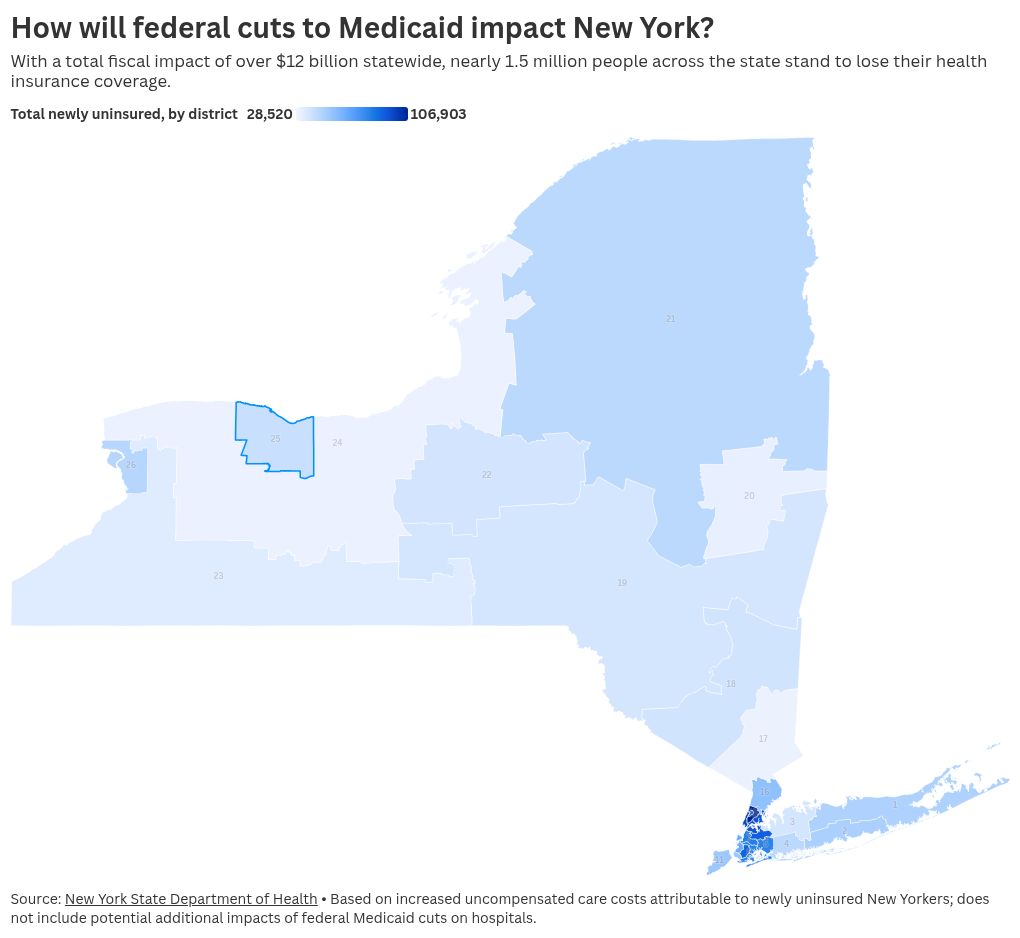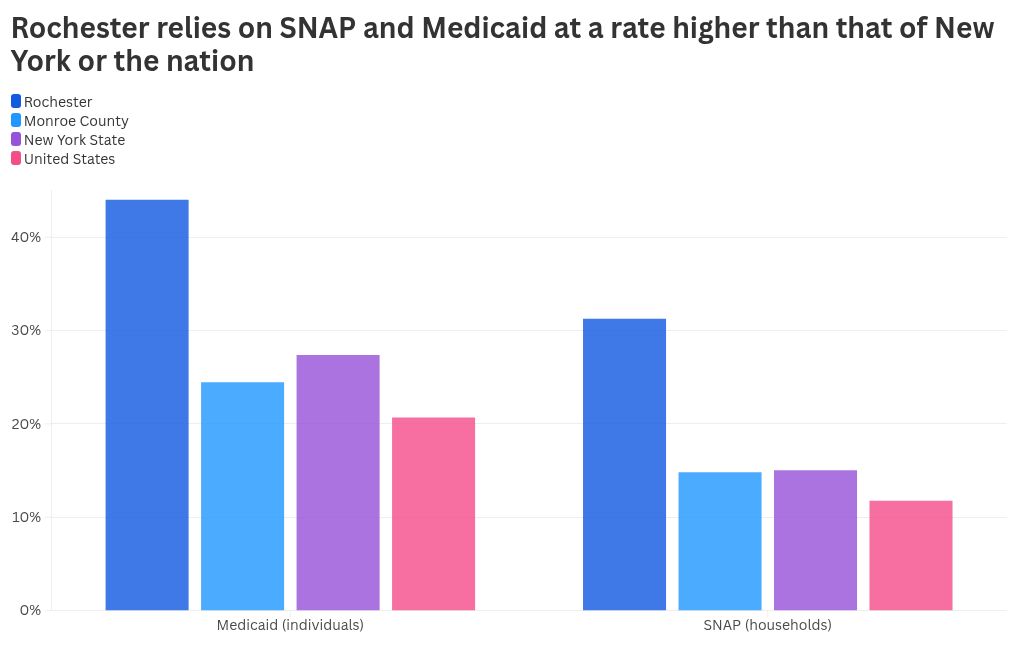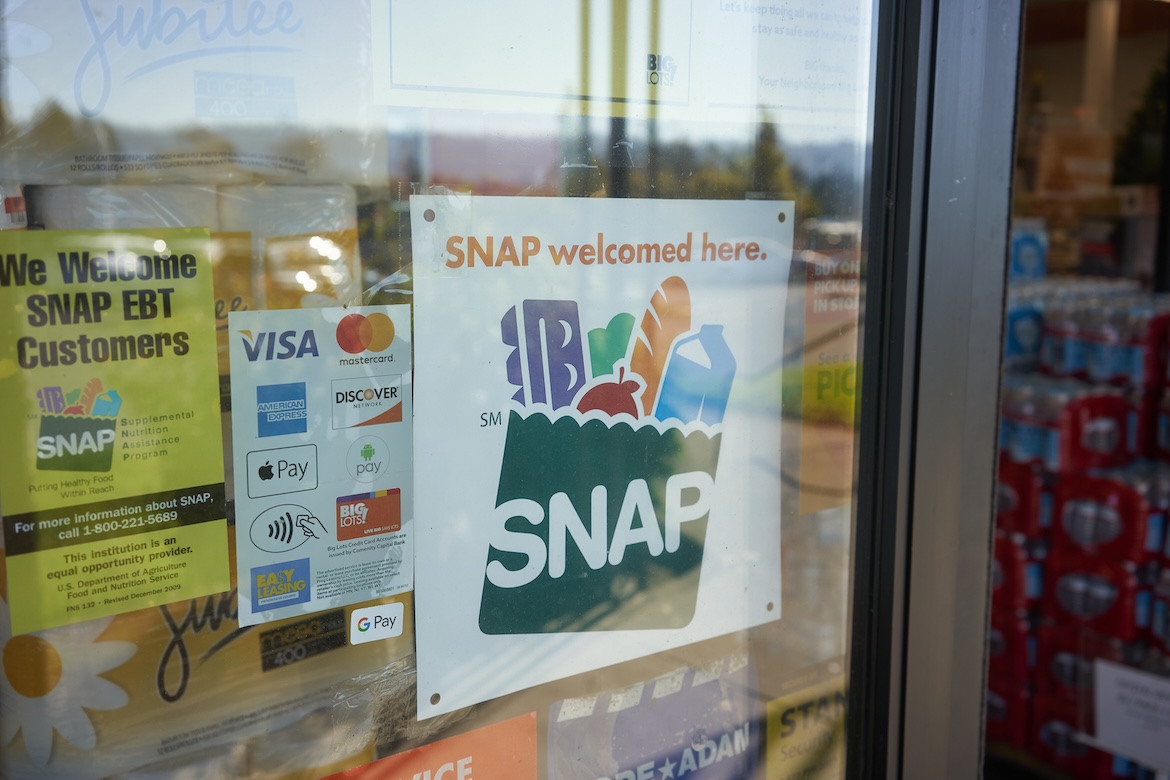![]()
With a surge in need for food assistance throughout its service region, Foodlink has allocated more money in this year’s budget than ever before for emergency food provisions.
“We have an infrastructure that the entire region depends upon and that no one else really has,” says Julia Tedesco, CEO of the Rochester nonprofit focused on tackling food insecurity. “We have to make sure that we are prepared, ready to continue to safely store and distribute food.”
Meanwhile, the University of Rochester Medical Center executive leadership team developed contingency plans earlier this year in the event of budgetary shortfalls should the federal government reduce investment in health care—a concern that has grown substantially since passage of the federal budget reconciliation bill.
Sweeping federal changes to eligibility and funding for the Supplemental Nutrition Assistance Program and Medicaid have put at risk access to food and health care for nearly 1.5 million individuals throughout New York, including hundreds of thousands in the Rochester region.
With more than $1 trillion in cuts expected over the next decade, service providers and legislators are re-evaluating access to care for residents who rely on these programs. Some warn of a catastrophic impact.
Officially titled the One Big Beautiful Bill Act, the federal budget reconciliation bill makes broad changes to work requirements for qualifying individuals and calls for cuts designed to shift fiscal responsibility for SNAP and Medicaid toward state governments.
SNAP will face nearly $186 billion in cuts through 2034, with the federal share of administrative costs dropping from 50 percent to 25 percent starting in the 2027 fiscal year. Veterans, unhoused individuals, and former foster youth will lose work-requirement exemptions, while refugees, asylees, and trafficking survivors are now excluded from SNAP—providing benefits solely to citizens aged 18 to 64 who work at least 80 hours a month.

Similar Medicaid restrictions will be implemented, with nearly $1 trillion in cuts over the next decade. Previously, eligibility could not be conditioned on work without a Section 1115 waiver. And certain groups—refugees, asylees, Cuban/Haitian entrants and trafficking survivors—were eligible immediately. With the new bill, eligibility will be restricted to U.S. citizens, green card holders, and other selected groups of immigrants—and all will be subject to the work requirement.
These changes threaten health insurance coverage for more than 2 million New York residents now on Medicaid or the Essential Plan (statewide coverage offered to lawful residents ineligible for Medicaid). Analyses of the budget reconciliation bill by the state Department of Health indicate an overall fiscal impact of over $12 billion annually, with up to 1.5 million people at risk of becoming uninsured.
Roughly 205,000 people in the state’s 25th Congressional District, which includes Monroe County and part of Ontario County, are enrolled in Medicaid. Under the federal budget reconciliation bill, an estimated 35,475 individuals would be newly uninsured, with 5,067 losing coverage under the Essential Plan. The district would face a total fiscal impact of $295 million annually, with hospitals facing an additional burden of more than $102 million to ensure services can cover those at risk of losing insurance.
Additional analysis by the Greater New York Hospital Association and the Healthcare Association of New York State indicates federal cuts could impact employment for nearly 2,000 hospital workers in the district, with an estimated $801 million in lost economic activity.
The challenges ahead
While the potential impact of these cuts is clear, the exact timeline of how families will be affected is not. Provisions are set to occur in various years. Changes in Medicaid eligibility, for instance, will be instituted in the 2027 fiscal year, as will changes in the federal share of SNAP administrative costs. The state’s response has yet to be determined. The uncertainty has forced service providers to be adaptive.
“Obviously, I think we can all agree that $1 trillion (in cuts) to federal health care spending will create some unique challenges for us,” URMC CEO David Linehan said during a July 18 webinar. “Regardless of the shifting priorities of the federal and state government, one thing is certain, and that is there will continue to be an enormous and growing demand for our services. The patients will keep coming.”
For Linehan, estimating the overall impact of Medicaid changes depends on how New York manages the shift in financial burden, from the financial government to the states. While Medicaid is not going away entirely, he said, up to 40,000 people served by UR could lose coverage.
“While the numbers and the finances are important, let’s not lose our focus on the patients. These aren’t just spreadsheets. We’re talking about the health and well-being of our patients,” Linehan added. “This will make it more difficult for them to access primary care and preventative services, and they’ll present to us (more) often in extremis or with advanced disease in the emergency room instead of getting preventative care (because) they don’t have access to a primary care physician. So, this will create problems that we’re going to have to address.”
Estimates from the National Rural Health Association show Medicaid cuts will have a severe impact on rural areas, with nearly $70 billion in cuts placing significant financial pressure on hospitals nationwide. Reductions in Medicaid funding, according to a recently released report, would accelerate rural hospital closures, affecting several critical services.
Linehan is confident, however, that the UR Medicine network is in a strong position to mitigate any impact on rural health care.
“The reasons for specific concerns about rural hospitals is that they tend to have a higher proportion of patients on Medicaid, and in most cases have lower financial reserves,” Linehan said. “I think we had a real jumpstart on building this network of UR Medicine. And so it positions us in a much better place than a lot of rural hospitals and rural health care systems are dealing with.”
Despite previous efforts to fund and support rural hospitals, Rep. Claudia Tenney’s vote for the One Big Beautiful Act affirmed her support for Medicaid cuts that would threaten up to seven rural hospitals in the state’s 24th Congressional District, which she represents.
“The One Big Beautiful Bill restores economic freedom, strengthens our national security, and puts hardworking Americans first,” reads a July 3 statement. This is a major victory for the American people and a significant step in restoring prosperity, security, and strength for all Americans across our great nation.”
Tenney did not respond to a request for comment.

Health care access and food insecurity
Earlier this month, Rep. Joseph Morelle joined Trillium Health CEO Jason Bartholet-Kearns in a press conference detailing the impact of federal cuts on health care access in Rochester.
“We’re going to continue to fight back,” said Morelle. “I’m a co-sponsor of legislation to protect programs like Medicare and Medicaid. We’re going to continue to demand specific answers and implementation questions from administration officials, and we’re going to use congressional oversight and lawsuits, wherever possible, filed by partner organizations, to stop the administration dead in its tracks.”
The Congressional Budget Office estimates up to 11.8 million Americans may lose health insurance over the next decade; the Urban Institute predicts 22.3 million U.S. families will be affected by cuts to SNAP.
U.S. Census estimates from 2023 indicate just over 91,000 individuals rely on Medicaid in the city of Rochester, with nearly 30,000 households on SNAP benefits. According to Feeding America, nearly 100,000 people in Monroe County are food insecure. The 14605 ZIP code, located in Rochester, has the second-highest rate of food insecurity in the state, at 31.7 percent.

“There is no more effective anti-hunger program in the country than SNAP benefits,” says Mitch Gruber, senior vice president and chief impact officer at Foodlink, and an at-large member of Rochester City Council. “In my lifetime, there’s never been SNAP cuts like this. … SNAP is not just an anti-hunger program. It is an anti-poverty program.”
Foodlink faced Trump-era cuts even before the passage of the budget reconciliation bill. In March, the federal government cut up to $1.5 billion in funding used to supply food banks as part of the Emergency Food Network. With the cancellation of 24 USDA truckloads of food meant for the nonprofit’s food pantries, over $1 million worth of food has already been prevented from reaching families in need.
Many of the changes to SNAP target reducing waste, fraud, and abuse. Starting in the 2028 fiscal year, state governments will have to pay a percentage of SNAP’s food costs if they have higher payment error rates, the proportion of payments that are either overpaid or underpaid due to errors in eligibility and benefit determination.
A statewide payment error rate of 6 to 8 percent, for instance, would force the state to cover 5 percent of its food costs—and should the state be unable to make up for federal cuts in its budget, SNAP funding would likely be eliminated, ending food assistance entirely in the state.
Last year, New York recorded an error rate of 14.09 percent, a rate that would require the state to pick up 15 percent of overall costs, or $1.2 billion annually. Approximately $7.8 billion in SNAP benefits are issued annually statewide. While its payment error rates do exceed those of the nation’s, they have only done so by an average of roughly 1 percentage point.
“Taking any money away from (families) is just going to add additional stress and burden to (them), to our health care system, (and) to our nonprofit structurally,” says Gruber.
For Foodlink, mitigating uncertainty involves preparing and redeveloping internal operations to best accommodate households that are unclear about what benefits they will lose as a result of federal cuts. The nonprofit aims to be proactive in informing the public on exactly how they’ll be impacted over the years as federal changes begin to be implemented.
“We have a team of staff members (whose) job it is to help individuals sign up for SNAP benefits. We are going to start to think about how those individuals can reframe their message to not just (sign) people up, but also about how to help folks know what their eligibility requirements are and how to maintain eligibility,” says Gruber.
“We (also) want to make sure that we’re working with our partners across the nonprofit, government, and private sector to make sure that people have the opportunities to participate in the work requirements … regardless of how they end up happening.”
Leaders and governmental relations teams at URMC have stated they are actively engaged with members of Congress and federal agencies to discuss the impact of overall funding decisions. Preparation for the impact of these cuts, said Linehan, requires consistent and collaborative monitoring.
“We’ll need to monitor this really closely and partner with the Department of Health, with New York State, with our payers, with social care networks and care management organizations, to support our patients’ ability to obtain health insurance coverage and access to primary care and other supports to ensure that they stay well,” he said.
The Rochester-Monroe Anti-Poverty Initiative, along with 25 partner organizations, has sent a letter to New York’s federal representatives urging them to take action against looming federal cuts. The budget act, according to RMAPI, would reverse years of progress in poverty reduction, public health, and economic stability.
“Since RMAPI’s founding in 2015, Rochester’s poverty rate has dropped by more than 20 percent,” wrote Aqua Porter, RMAPI director, in an Aug. 13 newsletter. “But this progress remains fragile. Federal safety net programs like Medicaid and SNAP are not just lifelines for individuals; they fuel local economies, support jobs, and sustain entire communities.”
RMAPI did not respond to a request for further comment.
Following the passage of the budget reconciliation bill, Gov. Kathy Hochul convened a cabinet meeting in July to discuss the potential impact of federal cuts on the state budget. On Aug. 18, Hochul joined Rep. Ritchie Torres, who represents the 15th Congressional District, in a press conference warning of ramifications from the federal cuts.
“How cruel and depraved is it to not just take away a basic human right to have health care when you’re sick and you need it, but also say, ‘We don’t give a damn if you go hungry either,’ said Hochul. “Republicans in Washington have lost their soul. But here in New York, we have not lost our heart. We’ll always care about people. We’ll never give up on them. We’ll fight back.”
Narm Nathan is a Rochester Beacon contributing writer and a member of the Oasis Project’s inaugural cohort.
The Beacon welcomes comments and letters from readers who adhere to our comment policy including use of their full, real name. See “Leave a Reply” below to discuss on this post. Comments of a general nature may be submitted to the Letters page by emailing [email protected].
Related

